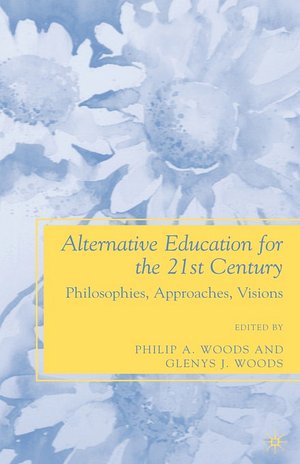Monday, March 5, 2012
Alternative Education for the 21st Century
Woods, Glenys, and Philip Woods, eds. Alternative Education for the 21st Century : Philosophies, Approaches, Visions . New York: Basingtoke: Palgrave Macmillan, 2009. Print.
This book focuses on a wide range of alternative philosophies and schools based on these philosophies and cultures.From Quaker, Buddhist, and Islamic schools, to education in Canada and Palestine, Alternative Education for the 21st Century gives the resources to find ways to incorporate holistic spirituality and democracy into education. This book gives insight into the options that students and educators possess in a shrinking educational climate, at least in the traditional sense. By introducing less common means of acquiring and fostering knowledge, Philip and Glenys woods present the opportunity to involve something more meaningful into a system which is becoming dull, undesirable, and ineffective.
Authors Philip and Glenys Woods are a married couple who focus on spirituality and enlightenment. Philip is a professor, a sociologist, and an "educationalist", and Glenys is an "educational researcher, with a holistic approach to learning, and a healer, priestess and lightworker" and focuses on spritual development and alternative forms of education.
As this is a collection of essays, I would like to look at individual chapters of the book that will be most suited for my research subject. The book focuses on education as a whole, and I feel that examining elementary and secondary education is crucial in the study of college education.
Chapter Selections:
The K20 Model for Systemic Educational Change and Sustainability: Addressing Social Justice in Rural Schools and Implications for Educators in All Contexts
O'Hair, Williams, Wilson, Applegate
This chapter presents the common education system in a light which is faulty in the context of rural America. In response, it proposes and examines a 20 grade model in which educators abandon the K-12 Model and refer to education as a Kindergarten to Graduate School process. This model was developed by the K20 Center of University of Oklahoma, in order to benefit students in rural education systems.
"To date, the K20 center has impacted more than 500 schools, mainly rural, and more than 90,000 students. It helps reduce the inequitable conditions of professional, cultural, and social isolation and the lack of professional development in rural schools." (17)
A Buddhist Approach to Alternative Schooling: The Dharma School, Brighton, UK Clive Erricker
I will be using this chapter in conjunction with my analysis of Naropa University in CO, which is a Buddhist University. I feel that spiritual education is a beneficial experience, and plan to exhibit this through the analysis of The Dharma School as an introduction to Naropa.
"The vision behind the type of education that this conference and its report wished to promote is well expressed in the following extract:
Do not force others, including children, by any means whatsoever, to adopt your views, whether by authority, threat, money, propaganda, or even education. however, through compassionate dialogue, help others renounce fanaticism and narrowness (Carrey 1992) "
Subscribe to:
Post Comments (Atom)

No comments:
Post a Comment